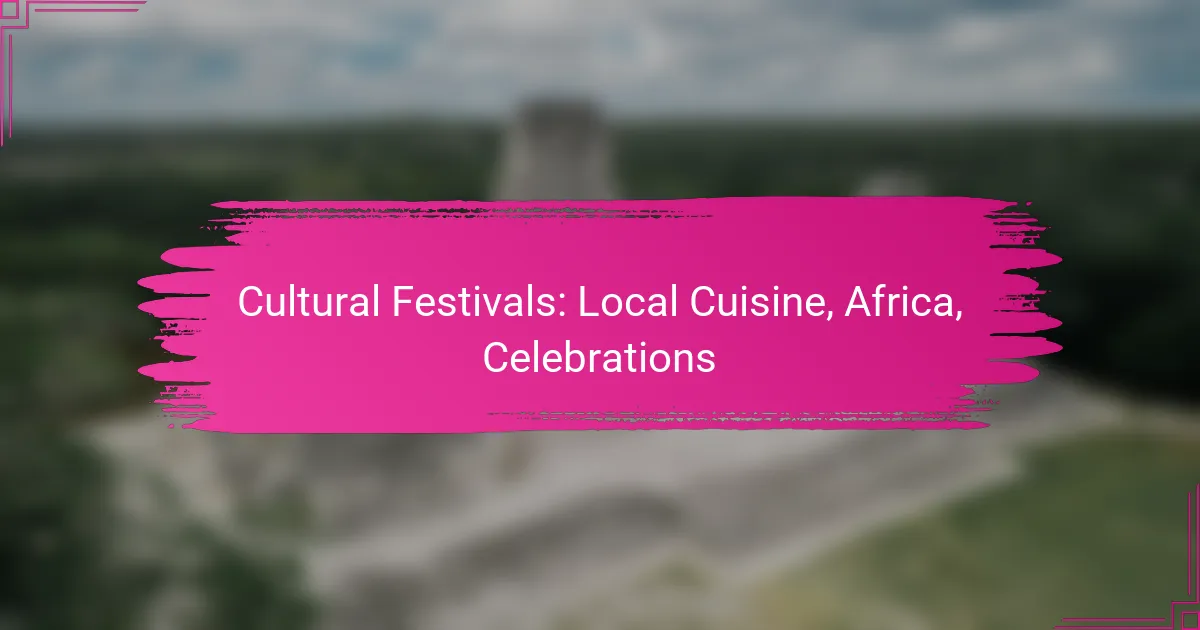Africa is home to vibrant cultural festivals that celebrate local cuisine, offering a rich tapestry of flavors and traditions. These events provide a platform for communities to showcase their culinary heritage through traditional dishes, cooking demonstrations, and interactions with local chefs. By highlighting key ingredients and regional specialties, these festivals not only promote culinary tourism but also foster pride and economic opportunities within the community.
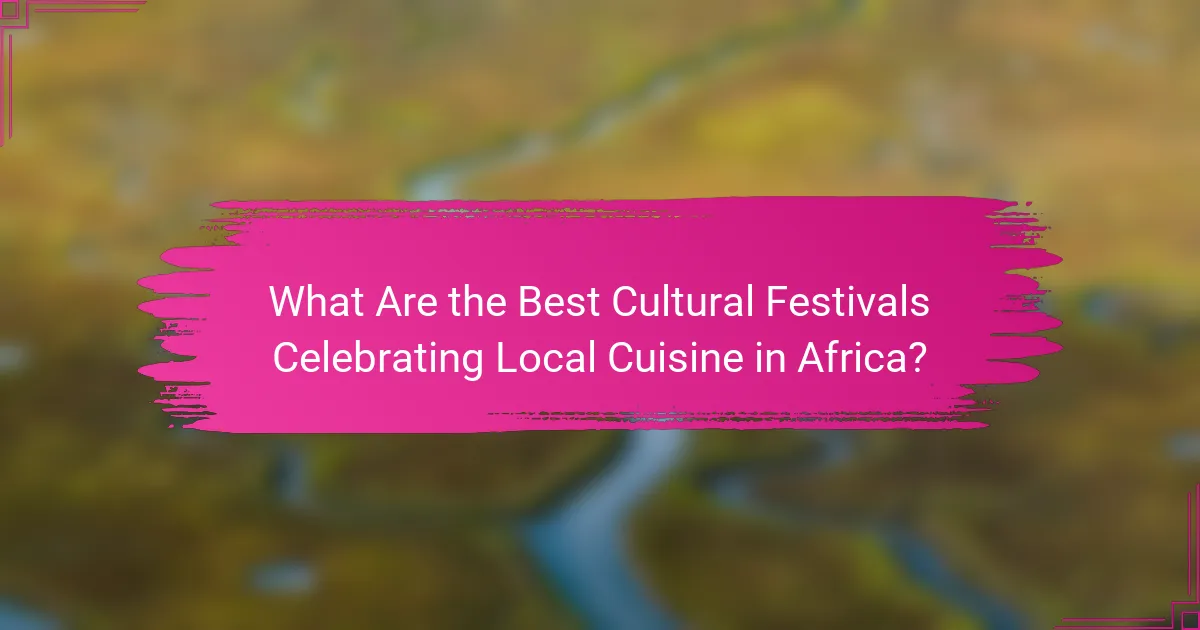
What Are the Best Cultural Festivals Celebrating Local Cuisine in Africa?
Africa hosts numerous cultural festivals that highlight local cuisine, showcasing diverse culinary traditions and flavors. These festivals often feature traditional dishes, cooking demonstrations, and opportunities to engage with local chefs and food artisans.
Feast of the Tabernacles in South Africa
The Feast of the Tabernacles, celebrated in South Africa, is a vibrant festival that combines religious observance with culinary delights. It typically includes communal meals featuring traditional dishes such as bobotie, potjiekos, and various braai (barbecue) specialties.
Visitors can enjoy food stalls, cooking competitions, and workshops that emphasize local ingredients and cooking techniques. This festival not only celebrates food but also fosters community spirit and cultural exchange.
Fes Festival of World Sacred Music in Morocco
The Fes Festival of World Sacred Music is renowned for its fusion of music and culinary arts, held annually in the historic city of Fes. This festival features a variety of local Moroccan dishes, including tagines and couscous, often served in traditional settings.
Attendees can participate in cooking classes and tastings that highlight the rich flavors of Moroccan cuisine. The event emphasizes the connection between food, culture, and spirituality, making it a unique culinary experience.
Gerewol Festival in Chad
The Gerewol Festival in Chad is a captivating celebration of the Wodaabe people, showcasing their culture through music, dance, and traditional foods. During this festival, visitors can sample local delicacies such as grilled meats and millet porridge, which are integral to the Wodaabe diet.
This event is not only about food; it also features beauty contests and traditional performances, creating a lively atmosphere that immerses participants in the local culture. Engaging with the community during this festival provides a deeper understanding of their culinary heritage.
Durbar Festival in Nigeria
The Durbar Festival in Nigeria is a spectacular event that marks the end of Ramadan, celebrated with parades and traditional feasts. Local cuisine plays a central role, with dishes like jollof rice, suya (spicy meat skewer), and various stews being served to thousands of attendees.
This festival is an excellent opportunity to experience the rich flavors of Nigerian food while enjoying the vibrant displays of horsemanship and cultural performances. Visitors should arrive hungry, as the variety of food offerings is extensive and showcases the country’s culinary diversity.
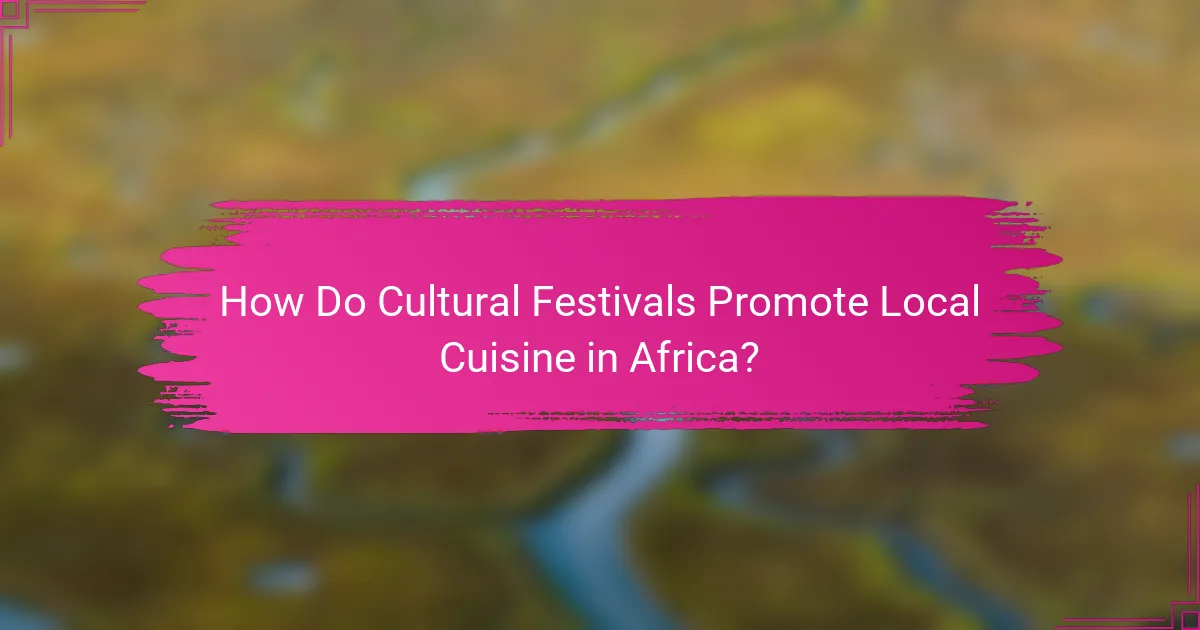
How Do Cultural Festivals Promote Local Cuisine in Africa?
Cultural festivals in Africa play a vital role in promoting local cuisine by highlighting traditional dishes, encouraging food production, and attracting culinary tourism. These events create a platform for communities to showcase their unique culinary heritage, fostering pride and economic opportunities.
Showcasing traditional dishes
Cultural festivals provide an opportunity for local chefs and home cooks to present traditional dishes that reflect their heritage. These events often feature cooking demonstrations, tastings, and competitions, allowing attendees to experience authentic flavors and cooking techniques.
For example, during the annual Cape Town International Jazz Festival, local vendors serve dishes like bobotie and braai, showcasing South Africa’s diverse culinary landscape. Such exposure helps preserve traditional recipes and encourages younger generations to appreciate their cultural roots.
Encouraging local food production
By promoting local cuisine, cultural festivals stimulate interest in local food production. Farmers and producers often participate in these events, selling their goods and connecting with consumers who value fresh, locally sourced ingredients.
Festivals like the Zanzibar International Film Festival incorporate local food markets, where farmers can showcase their produce. This not only boosts sales but also encourages sustainable agricultural practices, as communities recognize the importance of supporting local farmers.
Attracting culinary tourism
Cultural festivals attract culinary tourists who seek authentic experiences and flavors. These visitors contribute to the local economy by dining at restaurants, purchasing local products, and participating in cooking classes offered during the festivals.
Events such as the Dakar Biennale in Senegal draw international attention, leading to increased tourism and interest in local cuisine. By highlighting unique dishes and culinary traditions, festivals can transform a region into a culinary destination, benefiting local businesses and artisans.
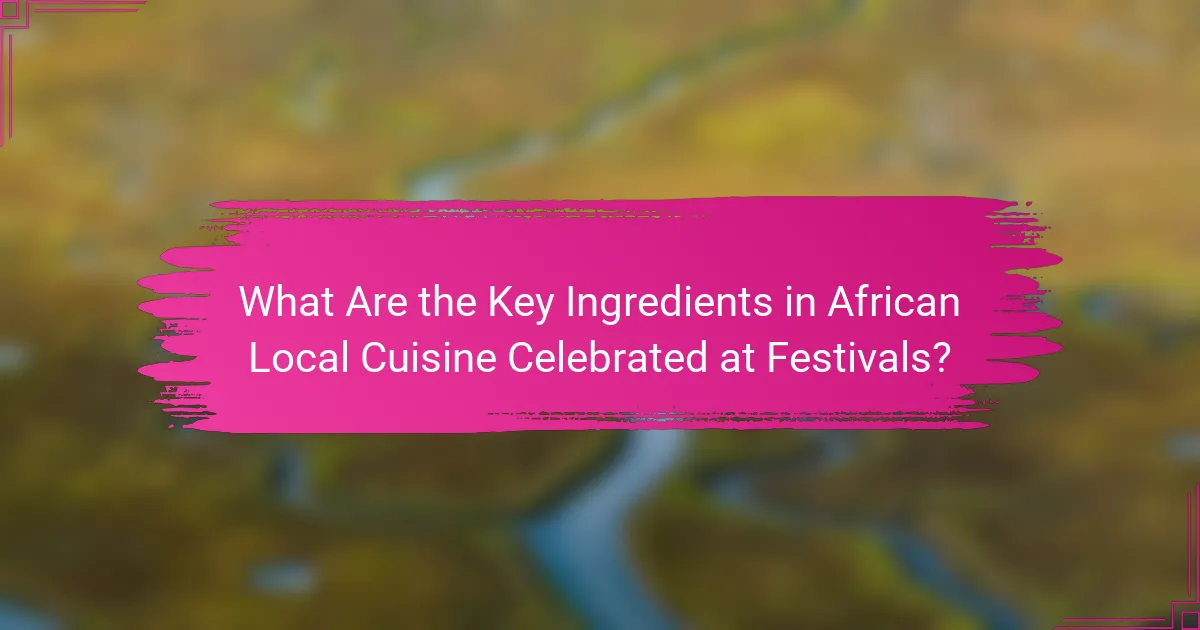
What Are the Key Ingredients in African Local Cuisine Celebrated at Festivals?
Key ingredients in African local cuisine celebrated at festivals include staples like maize, a variety of spices, and fresh fish, each contributing to the unique flavors and traditions of different regions. These ingredients not only reflect the agricultural practices of the area but also the cultural significance tied to various celebrations.
Maize in South African dishes
Maize, or corn, is a fundamental ingredient in South African cuisine, often featured in dishes like pap, a type of porridge served with meat and vegetables. During festivals, maize is celebrated in various forms, including maize-based breads and stews, showcasing its versatility and importance in local diets.
When preparing maize dishes for celebrations, consider using traditional methods such as grinding whole kernels to make mealie meal. This adds authenticity and enhances the flavor profile of the dishes served at festivals.
Spices in Moroccan cuisine
Moroccan cuisine is renowned for its rich and aromatic spices, which play a crucial role in dishes served during festivals. Common spices include cumin, coriander, saffron, and cinnamon, each adding depth and complexity to traditional meals like tagines and couscous.
To create authentic Moroccan dishes, use a balanced blend of spices, adjusting to taste. A typical spice mix might include equal parts of cumin and coriander, with a pinch of saffron for special occasions, ensuring that the flavors are vibrant and inviting.
Fish in coastal festival dishes
In coastal regions of Africa, fish is a prominent ingredient in festival dishes, reflecting the local fishing culture. Popular fish varieties include tilapia, snapper, and sardines, often grilled or used in stews, celebrated for their freshness and flavor.
When preparing fish for festivals, consider marinating it with local herbs and spices to enhance its taste. Serving fish with traditional sides like rice or plantains can create a well-rounded meal that honors the coastal heritage of the region.
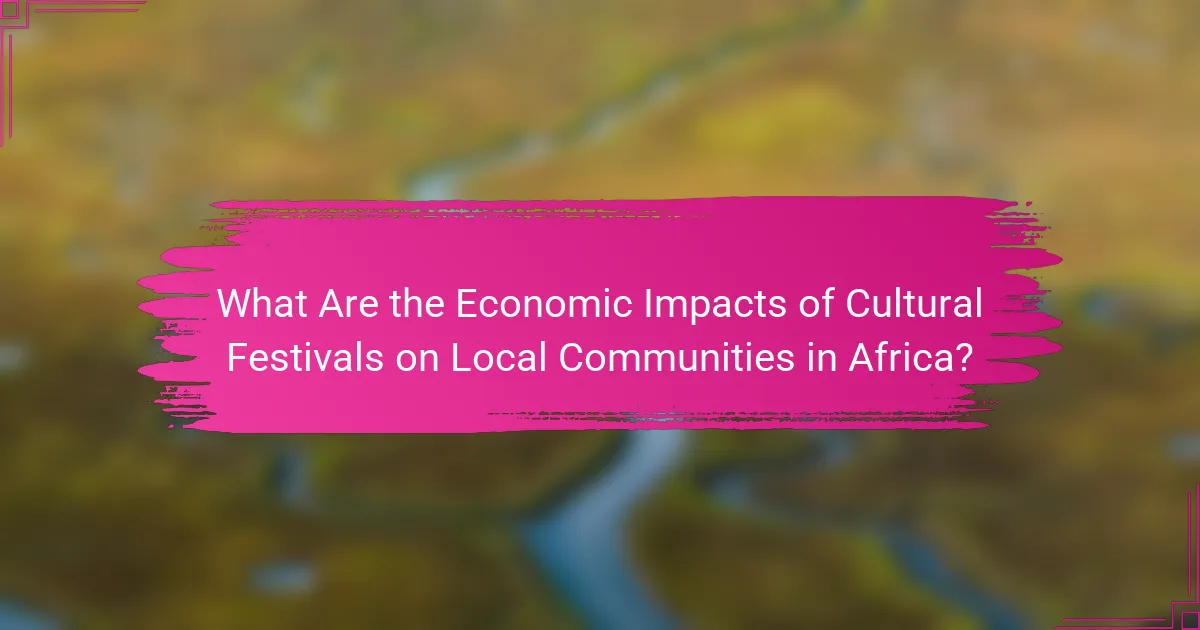
What Are the Economic Impacts of Cultural Festivals on Local Communities in Africa?
Cultural festivals in Africa significantly boost local economies by generating income and creating jobs. These events attract tourists, which leads to increased spending in various sectors, benefiting the community as a whole.
Job creation through tourism
Cultural festivals create numerous job opportunities, particularly in the tourism sector. Local guides, hospitality staff, and vendors often see increased demand during these events, leading to both temporary and permanent employment options.
For instance, a festival attracting thousands of visitors may create hundreds of jobs in areas like accommodation, food services, and transportation. This influx can help reduce local unemployment rates, especially in regions where job opportunities are limited.
Boosting local businesses
Local businesses benefit immensely from cultural festivals as they experience a surge in customers. Restaurants, artisans, and shops often see increased sales during these events, which can lead to higher profits and potential expansion.
For example, a craft market set up during a festival can provide local artisans with a platform to sell their goods, promoting their work and generating income. This not only supports individual businesses but also fosters a sense of community and cultural pride.
Increasing cultural awareness
Cultural festivals serve as a platform for showcasing local traditions, cuisine, and art, enhancing cultural awareness among attendees. Visitors gain insights into the unique heritage of the region, which can lead to greater appreciation and respect for local customs.
Moreover, these events often encourage cultural exchange, where locals and tourists interact, share experiences, and learn from one another. This exchange can promote tourism in the long run, as visitors may return or recommend the destination to others.

What Criteria Should You Consider When Choosing a Cultural Festival to Attend in Africa?
When selecting a cultural festival in Africa, consider factors like location, cuisine, and the duration of events. These elements significantly influence your experience and help you decide which festival aligns best with your interests.
Location and accessibility
The location of a festival is crucial for planning your visit. Consider how far it is from major cities, available transportation options, and local accommodations. Festivals in urban areas may offer easier access to amenities, while those in rural settings can provide a more authentic experience.
Check for accessibility features if you have specific needs. Some festivals may be more accommodating than others, so researching ahead can ensure a smoother experience.
Type of cuisine featured
Cultural festivals in Africa often showcase local cuisine, which can be a highlight of the event. Look for festivals that feature dishes representative of the region, such as tagines in Morocco or jollof rice in West Africa. This gives you a chance to explore diverse flavors and cooking styles.
Consider dietary restrictions or preferences when choosing a festival. Many events offer vegetarian or vegan options, but it’s wise to verify in advance to ensure your needs are met.
Festival duration and activities
The duration of a festival can vary widely, from a single day to several weeks. Longer festivals may offer more activities, such as workshops, performances, and cultural exhibitions, allowing for a deeper engagement with the local culture.
Review the schedule of events to see what activities are planned. Prioritize festivals that align with your interests, whether you prefer music, dance, or culinary experiences, to maximize your enjoyment.
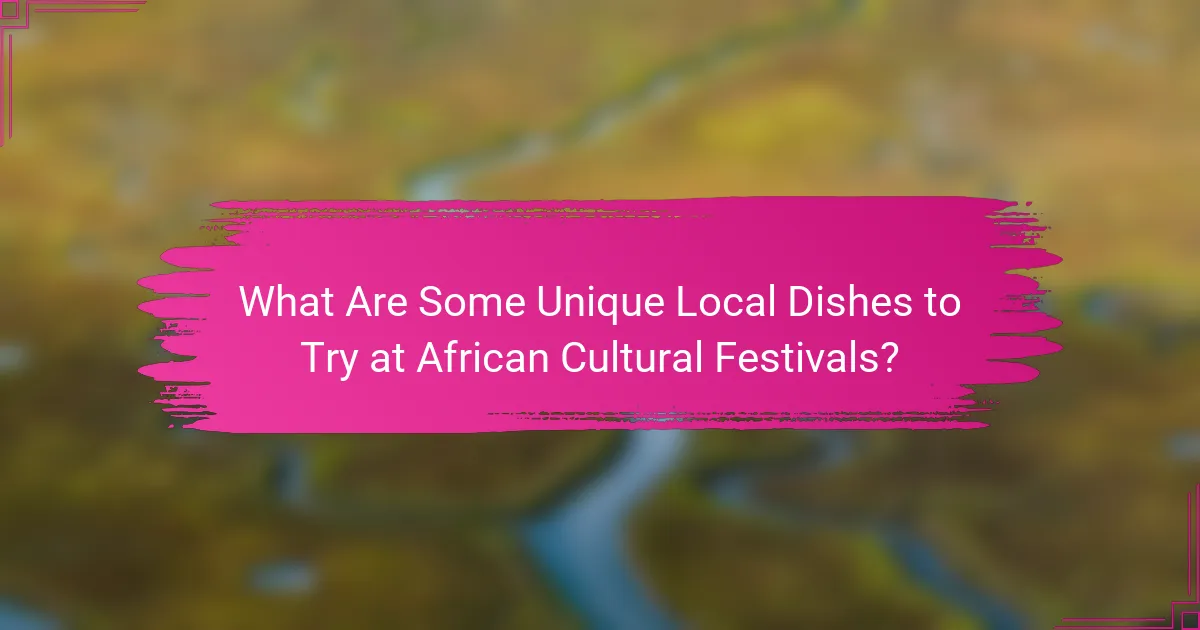
What Are Some Unique Local Dishes to Try at African Cultural Festivals?
African cultural festivals showcase a rich variety of local dishes that reflect the continent’s diverse culinary traditions. Attendees can expect to taste a range of flavors, ingredients, and cooking techniques that vary by region and culture.
West African Jollof Rice
Jollof rice is a beloved dish in West Africa, particularly in countries like Nigeria and Ghana. It consists of rice cooked in a flavorful tomato sauce, often accompanied by vegetables and proteins such as chicken or fish. Each country has its own twist on the recipe, making it a staple at festivals.
When trying Jollof rice, look for variations in spice levels and ingredient combinations. Some versions may include bell peppers, onions, and a variety of spices, while others might be simpler. Pair it with fried plantains for a complete meal.
East African Ugali
Ugali is a staple food in East Africa, made from maize flour and water, resulting in a dense, dough-like consistency. It is commonly served with stews or vegetables and is a central part of meals in countries like Kenya and Tanzania. At festivals, you can often find it served alongside flavorful meat or vegetable dishes.
To enjoy Ugali, tear off a piece and use it to scoop up accompanying dishes. This hands-on approach enhances the communal experience typical of African celebrations.
North African Tagine
Tagine is a slow-cooked stew named after the earthenware pot in which it is prepared. Popular in North African countries like Morocco, tagine dishes often feature a mix of meats, vegetables, and aromatic spices. Festivals often showcase a variety of tagines, highlighting local ingredients and flavors.
When sampling tagine, pay attention to the unique combinations of spices such as cumin, coriander, and saffron. The dish is typically served with bread or couscous, making it a hearty option for festival-goers.
Southern African Braai
A braai, or barbecue, is a social event in Southern Africa, particularly in South Africa. It features a variety of grilled meats, including boerewors (sausage), steaks, and chicken, often accompanied by sides like pap (maize porridge) and chakalaka (spicy vegetable relish). Festivals often include communal braai setups, allowing visitors to enjoy this culinary tradition.
At a braai, try to sample different meats and sides to get a full experience of Southern African flavors. The communal nature of a braai makes it a perfect way to connect with locals and other festival attendees.
